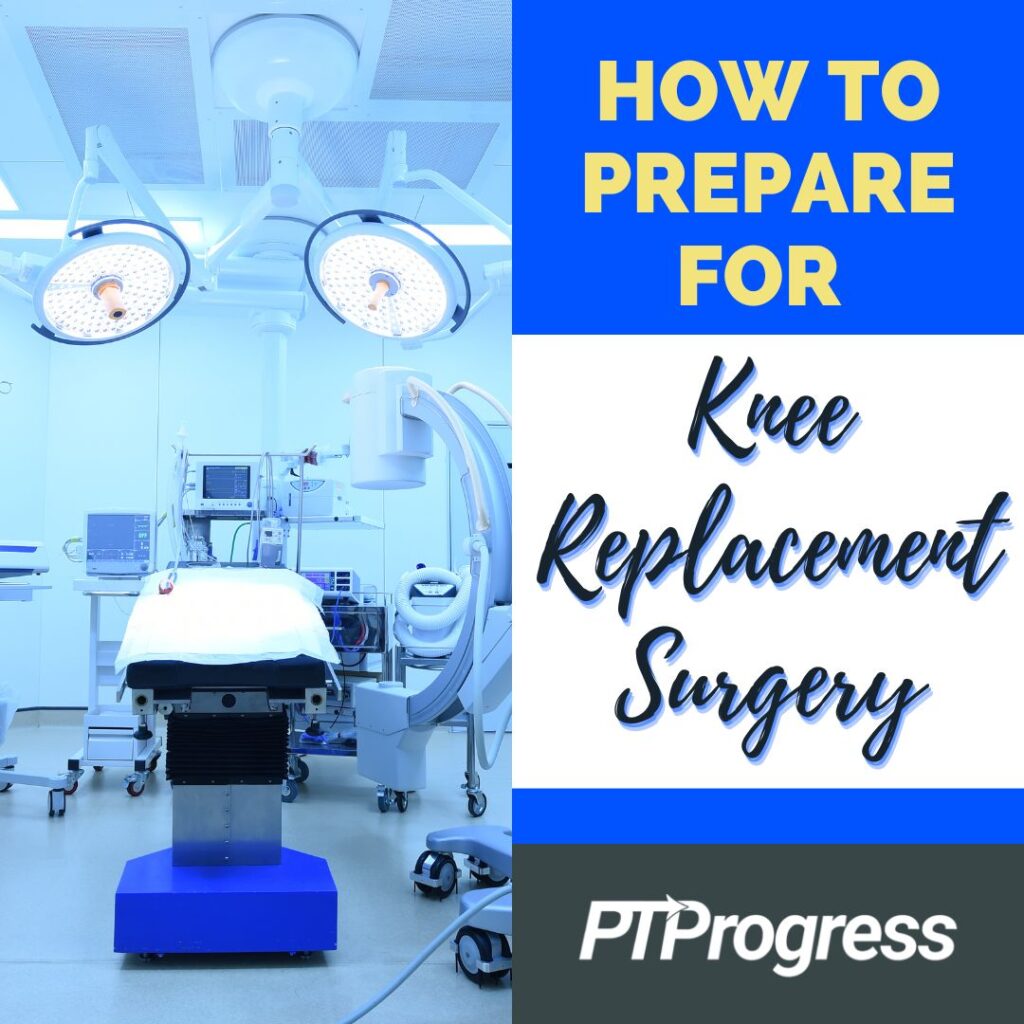
Knee replacement surgery is one of the most common procedures in orthopedics, providing long-lasting relief of knee pain for over 600,000 Americans annually. But if it’s your first time going under the knife, you may feel a little uneasy. In this post I’ll cover everything you need to know to prepare, from the months leading up to your surgery to the day before.
Preparing for Knee Replacement Surgery: Start with Your Surgeon
If you’re planning to undergo a total knee arthroplasty (or TKA for short), chances are you’ve been dealing with knee pain for a long time. Most TKA patients seek the procedure to relieve end-stage degenerative osteoarthritis that hasn’t responded well to non-invasive options such as injections and therapy.
Choosing to replace your knee is a big decision that shouldn’t be taken lightly. Instead of rushing to book the procedure, take some time to find a reputable surgeon you might consider for the operation. Word-of-mouth recommendations are often the best place to start. Know anyone in your family or at work who’s recently undergone a TKA? Ask what they thought of their surgeon and whether they’d recommend him or her.
Another idea is to call a couple physical therapy clinics in your area and ask the clinic director if there’s an orthopedic surgeon they’d recommend for knee surgery. This is also a great opportunity to ask questions on how each PT clinic is run (is there one-on-one care, what is the average appointment length, etc.), so you can make a more informed decision when choosing a clinic for your therapy later on.
Once you’ve got a few names of surgeons to consider, ask if you can meet with them for a consultation. Below are some questions to ask that can help you decide whether this surgeon is the one you want replacing your knee.
Questions to Ask Your Surgeon:

“Are you board-certified?”
Board-certification ensures your surgeon has earned the approval of the ABOS (the American Board of Orthopaedic Surgery) and undergoes certification reexamination every ten years.
“How many knee replacements do you perform annually?”
There’s no magic number, but look for a surgeon who does at least 5 knee replacements a month, with a significant portion of their practice devoted to TKAs.
“What is your recommendation for physical therapy after a TKA?”
It’s always helpful to familiarize yourself with the kind of recovery protocol your surgeon recommends, even long before your surgery day.
How to Prepare for a Knee Replacement: A Timeline
Knee replacement surgery is an already highly-successful procedure, with 90–95% of all surgeries resulting in long-lasting relief of knee pain. But you can ensure that success and longevity even more by taking these steps to prepare, starting as far back as 6 months before your surgery.
2–6 Months Before Surgery
In the six months leading up to your surgery, prepare your body for a strong recovery by establishing healthful habits.
Keep a healthy diet of vegetables, fruits, whole grains, and protein.

When adequate nutrients are already a part of your regular diet, your body will have at the ready the tools it needs to heal.
Attain and maintain a healthy weight.
Eating better should help you shed some pounds, which can alleviate the stress placed on your new knee. Just avoid crash diets and aim to lose the weight slowly and surely.
Quit nicotine and tobacco use at least 6 weeks prior to surgery.
These harmful habits will only impede your recovery, so you’re better off quitting before you get your new knee. Besides, your surgeon may require it.
Complete dental work 6–8 weeks prior to surgery
If you can avoid it, try to complete all dental work long before your TKA. This will help you avoid having an infection travel through your bloodstream from your gums to your new knee. You also shouldn’t have any dental work done 4–6 months after the procedure, so make sure you get it all done two months ahead of time.
1–2 Months Before Surgery
The weeks before surgery are the best time for you to prepare your home, strengthen your body, and ensure you’ve dotted all your i’s and t’s.
Confirm that your insurance will cover surgery and PT.
This may feel obvious, but coverage can change from year to year, and it’s always a good idea to call your insurance company to ensure everything is still covered.
Prepare your home to be TKA-patient-friendly

Be proactive; give yourself a first-floor bedroom, install safety handles, buy an elevated toilet and shower seat, and store all essentials within reach. You’ll thank yourself later.
Secure a walker and cane to use or borrow.
Your hospital may provide a walker or cane (call and ask!), but these devices are also easy to find second-hand or through medical supply stores.
Schedule physical therapy using a prescription from your physician’s office.
Physical therapy typically begins within 3 days of your surgery. You’ll have more peace of mind in the weeks leading up to surgery if you’ve already scheduled the first PT appointment.
Perform prehabilitation exercises three times a week, three weeks before.
To expedite your recovery and increase your range of motion, consider performing physical therapy before you go under the knife.
A Word About Exercising Before Knee Surgery
If that last point has you thinking, “Wait, why would I exercise now? My knee is in pain!” allow me to explain. Research shows that pre-operative exercise can help improve knee function after surgery. Patients who perform these exercises at least 3 weeks before surgery have better outcomes, faster recoveries, and stronger bodies as a result.

Prehab exercises benefit TKA patients in a number of ways. Lower body exercise can increase your knee’s range of motion, while core work and upper body exercise can help you recover functional abilities much faster after surgery. Moreover, exercising regularly will boost your mental health and help you feel better inside and out.
Now, it’s vitally important that you consult your physician and physical therapist to discuss what kind of pre-hab exercises to perform. And remember: while some movements might feel uncomfortable, exercise should never cause you sharp pain.
The Final Push: The Week Before Surgery
Back to the timeline. In the final week before your knee replacement surgery, you’ll want to make sure all ducks are in a row; you’ve scoped out the hospital, you know what you’re bringing, and you have everything organized and in place.
Drive to the surgery location.
Save yourself some stress and drive to the hospital a few days before your surgery so you know where to go, where to park, and what traffic to anticipate.
Verify all prescriptions are in place.
Make sure your doctor has an updated list of your regular prescription medications in case you need to order any while admitted. Keep another copy with you for quick reference.
Finish preparing your home.
Reposition furniture for ease of entry, remove trip hazards such as rugs and cords, and complete chores such as grocery shopping, laundry, and meal prepping.
Prepare cold packs and/or ice machines.
You’ll be icing your knee a lot during your first few weeks at home, so make sure you’re set up to have a continual supply of cold therapy at your fingertips.
Don’t shave below your neck 7 days prior to surgery.
This is a standard precaution that can safeguard you from infection.
Use antibacterial soap, if recommended and provided by your surgeon.
Your surgeon may require that you shower with a particular antibacterial soap to help prepare your skin for knee replacement surgery.
Pack a personal bag.
With just a few days to go, make sure you have a personal bag packed and ready for your hospital stay. This may include the following items:

- Toiletries (toothbrush, toothpaste, deodorant)
- Glasses, readers, or dentures
- A book, headphones, and phone charger
- Loose-fitting clothing such as shorts, pajama bottoms, and slip-on shoes
- Your favorite pillow
- Any vitamins and supplements your doctor has cleared you to take.
The Day Before
You’ll receive specific instructions from your surgeon about what to do the day before your surgery. Below are some common requests.
Remove all nail polish prior to surgery.
Your surgeon will want your nail beds visible so they can quickly monitor your oxygen levels.
Remove all jewelry and leave it at home.
Wearing metal jewelry increases the risk of infection and can burn you if it comes into contact with electric surgical equipment.
Don’t eat or drink after midnight.

To avoid complications while under anesthesia, you’ll need to fast from food or drink before surgery—usually 8 hours or so.
Get plenty of sleep!
Adequate rest is something you should always strive for, but it’s especially essential before surgery. Sleep helps your body recover and can improve mental acuity, immune health, and your metabolism.
Preparing for Knee Replacement Surgery: Final Thoughts
The process of preparing for a TKA might seem overwhelming at first. But by following the timeline above, you can give yourself a head start with healthy habits, at-home organization, and all the safety precautions your surgery requires. Listen to your surgeon’s instructions and adhere to your post-operative physical therapy, and you’ll enjoy a successful outcome for years to come.

